|
|
|
Sort Order |
|
|
|
Items / Page
|
|
|
|
|
|
|
| Srl | Item |
| 1 |
ID:
100668
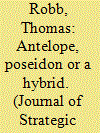

|
|
|
|
|
| Publication |
2010.
|
| Summary/Abstract |
It is the purpose of this article to illustrate how the British government reached its decision to upgrade the Polaris strategic nuclear deterrent in 1973. Using British and American documentation it is demonstrated that the strategic imperatives for upgrading Polaris were fundamental to the project. Existing accounts of the Polaris Improvement Project, however, have not given the appropriate attention to the wider US-UK political differences in this period. By doing so it is shown how in addition to the wider economic, strategic and political factors, this was of paramount significance in the Heath government opting for the 'Super Antelope' method in upgrading Polaris.
|
|
|
|
|
|
|
|
|
|
|
|
|
|
|
|
| 2 |
ID:
117356
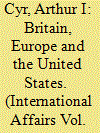

|
|
|
|
|
| Publication |
2012.
|
| Summary/Abstract |
A useful analytic distinction between structural and policy differences was made by Henry Kissinger; the former must be accommodated while the latter may be resolved. There is no shortage of tensions and disagreements between the United States and the nations of Europe. Likewise, the bilateral alliance between Britain and the US has been defined in part by disagreements. Even during the Second World War, when the relationship was redefined in modern terms, there were strong conflicts despite the extraordinary incentives for cooperation.
From the start, a key strength of the Anglo-American alliance was emphasis on institutional structures for the long term, viewed as a complement to the essential immediate cooperation in fighting and ultimately defeating the Axis powers. The insight of Jean Monnet and others in employing economic tools for political and diplomatic ends has proven essential. The fortieth anniversary of Britain's entry into the European Community is a useful benchmark for retrospective analysis. For the US, the twin commitments of an active international role and unification of Europe around economic matters has been remarkably consistent. As John Mearsheimer has argued, the end of the Cold War removed fundamental incentives for cooperation. Nonetheless, institutional structures of both the EU and NATO have survived.
Britain traditionally has been reluctant to engage in continuous institutional engagement with Europe, beyond the requirements of military alliances helpful or essential to national security. The lengthy uneven character of the road to membership in Europe's economic institutions reflects this fundamental attitude. Currently, Britain's ambiguous role of participation in European institutions but not in the euro may in fact facilitate transatlantic cooperation, and illustrates the usefulness of Kissinger's point. The fading of militarism in Europe since 1945 is a fundamental accomplishment, often overlooked in contemporary economic debate.
|
|
|
|
|
|
|
|
|
|
|
|
|
|
|
|
| 3 |
ID:
067720
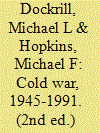

|
|
|
|
|
| Edition |
2nd ed.
|
| Publication |
Hampshire, Palgrave Macmillan, 2006.
|
| Description |
xvi, 188p.Pbk
|
| Series |
Studies in European History
|
| Standard Number |
1403933383
|
|
|
|
|
|
|
|
|
|
|
|
Copies: C:1/I:0,R:0,Q:0
Circulation
| Accession# | Call# | Current Location | Status | Policy | Location |
| 050661 | 909.825/DOC 050661 | Main | On Shelf | General | |
|
|
|
|
| 4 |
ID:
099987
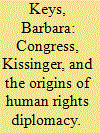

|
|
|
|
|
| Publication |
2010.
|
| Summary/Abstract |
The Congressional "human rights insurgency" of 1973-1977 centered on the holding of public hearings to shame countries engaging in human rights abuses and on legislation cutting off aid and trade to violators. Drawing on recently declassified documents, this article shows that the State Department's thoroughly intransigent response to Congressional human rights legislation, particularly Section 502B, was driven by Kissinger alone, against the advice of his closest advisers. Many State Department officials, usually from a mixture of pragmatism and conviction, argued for cooperation with Congress or for taking the initiative on human rights issues. Kissinger's adamant refusal to cooperate left Congress to implement a reactive, punitive, and unilateral approach that would set the human rights agenda long after the Ford administration left office.
|
|
|
|
|
|
|
|
|
|
|
|
|
|
|
|
| 5 |
ID:
106709
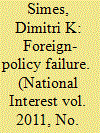

|
|
|
| 6 |
ID:
141224
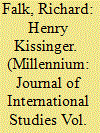

|
|
|
|
|
| Summary/Abstract |
Henry Kissinger the supreme scholar/statesman of the late 20th century has authored a comprehensive interpretation of world order that revises his earlier West-centric orientation. This essay review assesses Kissinger’s view that there is a need for a new consensual world order that enjoys the participation and real consent of such important non-Western political actors as China, India and the Islamic World (viewed as a totality). Implicitly, Kissinger realizes that in the post-colonial world purely European conceptions of world order will no longer provide stability, but he nevertheless believes that only by the pragmatic ‘reinvention’ of these conceptions by the whole world will it be possible to achieve a stable and legitimate world order.
|
|
|
|
|
|
|
|
|
|
|
|
|
|
|
|
| 7 |
ID:
029954
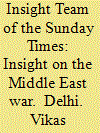

|
|
|
|
|
| Publication |
DelhI, Vikas Publishing House Pvt. Ltd., 1974.
|
| Description |
256p.hbk
|
|
|
|
|
|
|
|
|
|
|
|
Copies: C:1/I:0,R:0,Q:0
Circulation
| Accession# | Call# | Current Location | Status | Policy | Location |
| 013713 | 956.02/INS 013713 | Main | On Shelf | General | |
|
|
|
|
| 8 |
ID:
038679
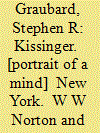

|
|
|
|
|
| Publication |
New York, W W Norton and Company Inc., 1973.
|
| Description |
xix, 288p.Hbk
|
| Standard Number |
0393054810
|
|
|
|
|
|
|
|
|
|
|
|
Copies: C:1/I:0,R:0,Q:0
Circulation
| Accession# | Call# | Current Location | Status | Policy | Location |
| 012228 | 923.273/GRA 012228 | Main | On Shelf | General | |
|
|
|
|
| 9 |
ID:
141225
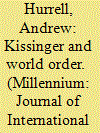

|
|
|
|
|
| Summary/Abstract |
Kissinger’s World Order: Reflections on the Character of Nations and the Course of History provides a powerful restatement of many of themes that have run through Kissinger’s previous writings, his commentary on international affairs, and his own view of the practice of own diplomacy. The book displays Kissinger’s capacity for grand synthesis and his ability to weave together a vast range of material into a coherent overall pattern. It is surely correct in pressing the case for taking the return of geopolitics seriously and for recognising the importance of different ways of seeing the world and of interpreting world order. But it is deeply flawed in the manner in which the themes of power and values are treated and in the moral and political lessons that are drawn from the analysis.
|
|
|
|
|
|
|
|
|
|
|
|
|
|
|
|
| 10 |
ID:
097986
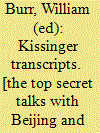

|
|
|
|
|
| Publication |
New York, The New Press, 1999.
|
| Description |
xix, 515p.
|
| Standard Number |
9781565845688
|
|
|
|
|
|
|
|
|
|
|
|
Copies: C:1/I:0,R:0,Q:0
Circulation
| Accession# | Call# | Current Location | Status | Policy | Location |
| 055142 | 327.73/BUR 055142 | Main | On Shelf | General | |
|
|
|
|
| 11 |
ID:
140536
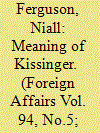

|
|
|
|
|
| Summary/Abstract |
There are reasons other than his longevity why so many world leaders—among them the Chinese President Xi Jinping—continue to seek the counsel of Henry Kissinger, who stepped down as U.S. secretary of state close to four decades ago. In this respect, Barack Obama is unusual. He is the first U.S. president since Dwight Eisenhower not to seek Kissinger’s advice. Periodically, commentators urge Obama to be more “Kissingerian.” Others argue that he is Kissinger¬ian in practice, if not in rhetoric. But what exactly does the term mean?
|
|
|
|
|
|
|
|
|
|
|
|
|
|
|
|
| 12 |
ID:
026340
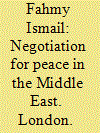

|
|
|
|
|
| Publication |
London, Croom Helm, 1983.
|
| Description |
331p.: plateshbk
|
| Standard Number |
0709910339
|
|
|
|
|
|
|
|
|
|
|
|
Copies: C:1/I:0,R:0,Q:0
Circulation
| Accession# | Call# | Current Location | Status | Policy | Location |
| 021901 | 956.04/FAH 021901 | Main | On Shelf | General | |
|
|
|
|
| 13 |
ID:
112148
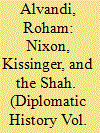

|
|
|
|
|
| Publication |
2012.
|
| Summary/Abstract |
The Nixon Doctrine marked a turning point in American strategies of containment in the Persian Gulf. Whereas Lyndon Johnson had sought to balance Iran and Saudi Arabia as the "twin pillars" of the region during the British withdrawal "east of Suez," between 1969 and 1972 Nixon gradually adopted a policy of Iranian primacy. Declining Anglo-American power does not provide an adequate explanation for this shift in U.S. Gulf policy. These constraints confronted both Johnson and Nixon, yet each president adopted quite distinct Gulf policies. Drawing on American, British, and Iranian sources, this article makes the case that the shift in U.S. Gulf policy from balancing under Johnson to Iranian primacy under Nixon reflected a change in American thinking about the shah of Iran, Muhammad Reza Pahlavi. This change in American thinking provided fertile ground for the shah's relentless efforts to secure Washington's backing for Iran's regional primacy throughout the 1970s.
|
|
|
|
|
|
|
|
|
|
|
|
|
|
|
|
| 14 |
ID:
163144
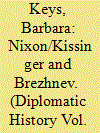

|
|
|
|
|
| Summary/Abstract |
In June 1973, Leonid Brezhnev arrived in Washington for his second summit meeting with President Richard Nixon. Knowing of the Soviet leader's fondness for luxury automobiles, Nixon gave him a shiny Lincoln Continental. Brezhnav was delighted with the present and insisted on taking a spin around Camp David, speeding through turns while the president nervously asked him to slow down.
|
|
|
|
|
|
|
|
|
|
|
|
|
|
|
|
| 15 |
ID:
029602
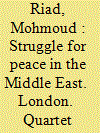

|
|
|
|
|
| Publication |
London, Quartet books, 1981.
|
| Description |
365p.hbk
|
| Standard Number |
0704322978
|
|
|
|
|
|
|
|
|
|
|
|
Copies: C:1/I:0,R:0,Q:0
Circulation
| Accession# | Call# | Current Location | Status | Policy | Location |
| 020799 | 956.04/RIA 020799 | Main | On Shelf | General | |
|
|
|
|
| 16 |
ID:
164662
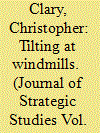

|
|
|
|
|
| Summary/Abstract |
This article examines decision-making mistakes made by U.S. President Nixon and national security advisor Kissinger during the 1971 India-Pakistan crisis and war. It shows that Nixon and Kissinger routinely demonstrated psychological biases that led them to overestimate the likelihood of West Pakistani victory against Bengali rebels as well as the importance of the crisis to broader U.S. policy. The evidence fails to support Nixon and Kissinger’s own framing of the 1971 crisis as a contest between cool-headed realpolitik and idealistic humanitarianism, and instead shows that Kissinger and Nixon’s policy decisions harmed their stated goals because of repeated decision-making errors.
|
|
|
|
|
|
|
|
|
|
|
|
|
|
|
|
| 17 |
ID:
120530
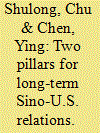

|
|
|
|
|
| Publication |
2013.
|
| Summary/Abstract |
Sino-U.S. relationship has been supported by two pillars: one being their shared interests and points in common, and the other being that neither side has challenged, threatened or opposed each other's core interests. The two powers should continue to strengthen these two pillars in order to maintain stable and positive relations.
|
|
|
|
|
|
|
|
|
|
|
|
|
|
|
|
| 18 |
ID:
158766
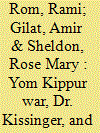

|
|
|
|
|
|
|
|